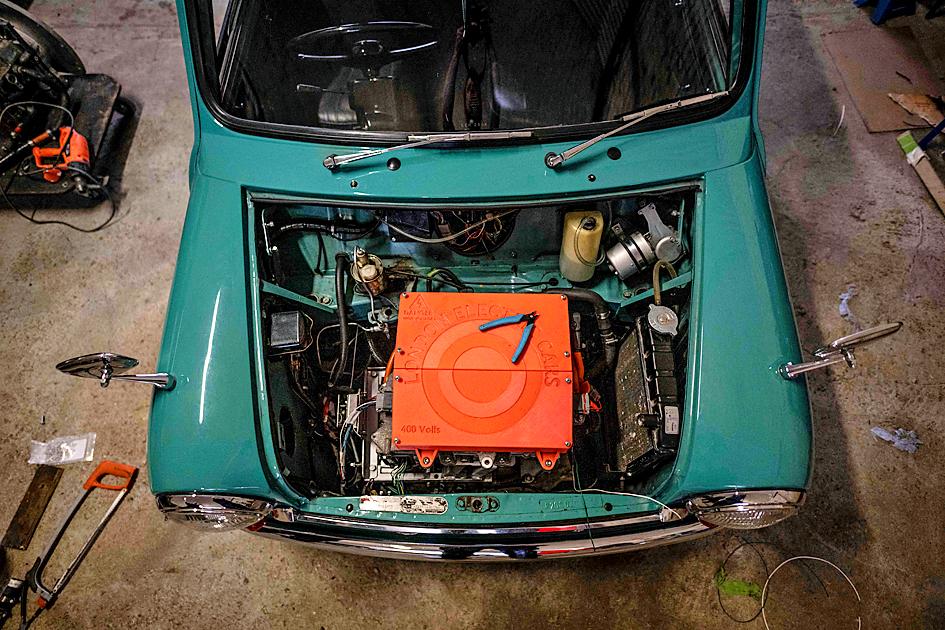Tucked away in a workshop under a London Underground line, vehicles are undergoing a green metamorphosis as they shed their cylinders, spark plugs and pistons for electric engines.
“We don’t create the associated carbon dioxide that comes from creating a new car and we’re not scrapping a perfectly valid old car. It’s win-win,” said Matthew Quitter, founder of London Electric Cars.
London Electric Cars is one of the companies capitalizing on the UK’s flexible regulatory environment and special affection for cars to help grow the fledgling sector.

Photo: AFP
In the workshop, all kinds of vehicles have come to be reborn: Minis, Bentleys, old ones — such as a 20-year-old Volvo station wagon — and some not so old, including a platypus-like Fiat Multipla.
Some families are turning to Quitter to save their beloved vehicles from the crusher, with places such as London expanding road charges for older and more polluting vehicles.
“They’re just keen that they don’t scrap this car because they have an emotional attachment,” he said. “The kids grew up in it and instead want to see it reborn as an electric vehicle.”

Photo: AFP
The cost of a conversion starts at £30,000 (US$30,000) — the equivalent of a new entry-level electric vehicle.
The renovated vehicles have a range of 80km to 300km, depending on the batteries.
This is more than enough when “90 percent to 95 percent of journeys inside London are under six miles [9.7km],” Quitter said.
The old engines can be kept, resold or destroyed.
Most of the vehicles are fitted with Nissan Leaf or Tesla engines, with the aim to stick as close as possible to the vehicle’s original performance and helping to avoid having to adapt the brakes or transmission.
“People realize that combustion engines are a disaster, they stink, they’re full of fumes, they make a lot noise and they’re responsible partly for climate breakdown,” Quitter said. “I think... we will look back on classic car ownership with petrol engines as a sort of anachronism.”
However, the umbrella body for historic automobile clubs, the Federation Internationale des Vehicules Anciens, said in 2019 that such conversions take away from the character of older vehicles and called for reversible modifications instead.
For purists, the noise, vibrations and smell of petrol are all part of the pleasure of an old vehicle.
Yet Quitter’s clients “aren’t interested in that at all,” he said, adding they want the “reliability” of electric cars without the smell and exhaust fumes of a petrol vehicle.
He also dismissed objections of those who say such modifications of classic vehicles are a desecration, saying no one complains about old houses being fitted with modern comforts.
“At the end of the day, it’s a very personal question in terms of what cars, for you, would be sacrilegious to convert,” he said, adding it would be unlikely he’d ever convert an Aston Martin.
He is joined on this point by Garry Wilson, head of the Historic & Classic Vehicles Alliance — which works to preserve vintage vehicles — who cited the Aston DB5, James Bond’s famous car.
Changing engines is something that has been done almost since the beginning of automotive history, but classic cars must be treated with respect, Wilson said.
“There’s an awful lot of vehicles out there where we should class them as part of our national heritage, and therefore should in theory treated like a Grade I listed building, and shouldn’t be modified,” he said.
“We’d be horrified if someone fitted new PVC windows in Blenheim Palace,” Wilson said. “Frankly, the Houses of Parliament would be better off being knocked down and rebuilt in modern materials, but it’s got Big Ben attached to it, it’s one of our national treasures.”
Wilson is also skeptical about the environmental benefits of such conversions for collector vehicles that travel only a few hundred kilometers a year on average, compared with 11,587km a year for contemporary vehicles.
This is especially true if parts for the batteries and engines come from the other side of the world, he said.
Instead, he thinks the solution rests with synthetic fuels, which emit carbon dioxide but are manufactured by absorbing it, and which he predicted would enable the sector to achieve carbon neutrality in 2050.

WEAKER ACTIVITY: The sharpest deterioration was seen in the electronics and optical components sector, with the production index falling 13.2 points to 44.5 Taiwan’s manufacturing sector last month contracted for a second consecutive month, with the purchasing managers’ index (PMI) slipping to 48, reflecting ongoing caution over trade uncertainties, the Chung-Hua Institution for Economic Research (CIER, 中華經濟研究院) said yesterday. The decline reflects growing caution among companies amid uncertainty surrounding US tariffs, semiconductor duties and automotive import levies, and it is also likely linked to fading front-loading activity, CIER president Lien Hsien-ming (連賢明) said. “Some clients have started shifting orders to Southeast Asian countries where tariff regimes are already clear,” Lien told a news conference. Firms across the supply chain are also lowering stock levels to mitigate

IN THE AIR: While most companies said they were committed to North American operations, some added that production and costs would depend on the outcome of a US trade probe Leading local contract electronics makers Wistron Corp (緯創), Quanta Computer Inc (廣達), Inventec Corp (英業達) and Compal Electronics Inc (仁寶) are to maintain their North American expansion plans, despite Washington’s 20 percent tariff on Taiwanese goods. Wistron said it has long maintained a presence in the US, while distributing production across Taiwan, North America, Southeast Asia and Europe. The company is in talks with customers to align capacity with their site preferences, a company official told the Taipei Times by telephone on Friday. The company is still in talks with clients over who would bear the tariff costs, with the outcome pending further

Six Taiwanese companies, including contract chipmaker Taiwan Semiconductor Manufacturing Co (TSMC, 台積電), made the 2025 Fortune Global 500 list of the world’s largest firms by revenue. In a report published by New York-based Fortune magazine on Tuesday, Hon Hai Precision Industry Co (鴻海精密), also known as Foxconn Technology Group (富士康科技集團), ranked highest among Taiwanese firms, placing 28th with revenue of US$213.69 billion. Up 60 spots from last year, TSMC rose to No. 126 with US$90.16 billion in revenue, followed by Quanta Computer Inc (廣達) at 348th, Pegatron Corp (和碩) at 461st, CPC Corp, Taiwan (台灣中油) at 494th and Wistron Corp (緯創) at

NEGOTIATIONS: Semiconductors play an outsized role in Taiwan’s industrial and economic development and are a major driver of the Taiwan-US trade imbalance With US President Donald Trump threatening to impose tariffs on semiconductors, Taiwan is expected to face a significant challenge, as information and communications technology (ICT) products account for more than 70 percent of its exports to the US, Chung-Hua Institution for Economic Research (CIER, 中華經濟研究院) president Lien Hsien-ming (連賢明) said on Friday. Compared with other countries, semiconductors play a disproportionately large role in Taiwan’s industrial and economic development, Lien said. As the sixth-largest contributor to the US trade deficit, Taiwan recorded a US$73.9 billion trade surplus with the US last year — up from US$47.8 billion in 2023 — driven by strong